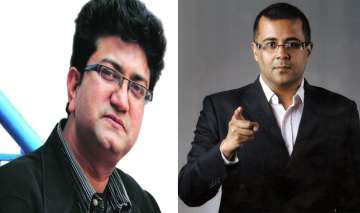Padmaavat row: Chetan Bhagat supports Prasoon Joshi, says his decision of skipping JLF is right
The Karni Sena had warned the chief of Central Board of Film Certification (CBFC), Prasoon Joshi to not attend the Jaipur Literature Festival (JLF).

Popular writer Chetan Bhagat supported Prasoon Joshi's decision to pull out of the ongoing Jaipur Literature Festival (JLF), saying he would have done the same had he faced threats like the poet-lyricist did. Joshi, who heads the Central Board of Film Certification (CBFC), announced that he would skip the festival, following threats from the Rajput group Karni Sena which had attacked him for clearing Sanjay Leela Bhansali's controversial film Padmaavat and had protested the JLF's invitation to him.
The CBFC chairman, who was scheduled to be in conversation with writer and filmmaker Anu Singh Choudhury tomorrow in a session, titled 'Main Aur Woh: Conversations with Myself', said he did not want the "dignity" of the prestigious event to be compromised.
"Prasoon is a friend of mine. We all love JLF and do not want to bring any disrepute to the festival. Prasoon took the right decision. I would have done the same if I were him. Why give free importance to anyone? People and children who have come here are interested in books, why turn this wonderful atmosphere into a political issue. That is why he perhaps did what he did," Bhagat said.
On the controversy surrounding film 'Padmaavat', he said, "Rajput's pride is centuries old. It is famous world over. One film cannot damage it. People do not even spare the God, but that does not demean the importance of God. It is not right to be so outraged for a film and bring a bad name to the country when the prime minister is abroad. Issues can be sorted out through dialogue also. You don't have to resort to violence if you don't like something."
Fringe Rajput groups violently protested the release of controversial film 'Padmaavat', based on the saga of the 13th-century battle between Maharaja Ratan Singh of Mewar and Sultan Alauddin Khilji of Delhi.
The groups allege that the film shows Rani Padmavati in "poor light". The queen is said to have committed 'jauhar' in 1303, preferring to die than be captured by Sultan Khilji.
Historians, however, are divided whether she actually existed, and the filmmakers have denied the allegations.
Bhagat requested the media to refrain from giving too much importance to fundamentalist groups. "People who are not elected and only disturb peace should not be given platforms...We need better law and order. There will always be people who will issue threats. The Supreme Court did a great job (by allowing the film's release)," he said.
"India is about celebrating different ideas. our country is very big. It is not easy to put our democracy in danger. It is because of the social media that the voice of some fundamentalist groups get amplified. That is why they seem more vocal because they have more platforms," he said.
Bhagat agreed that politics was played around the release of the movie and noted that the Supreme Court ruling was in sync with the constitutional guidelines.
"Every storyteller has a right to say what he or she wants to say. Today they have done this to a movie. Tomorrow journalists may be barred from filing their stories. The country cannot run like this. Democracy and freedom of expression go hand in hand. They cannot function in isolation," he said.
The Central Board of Film Certification, commonly called the censor board, has given a U/A certificate to the film and suggested five modifications, including title change to Padmaavat from Padmavati.
(With PTI Inputs)